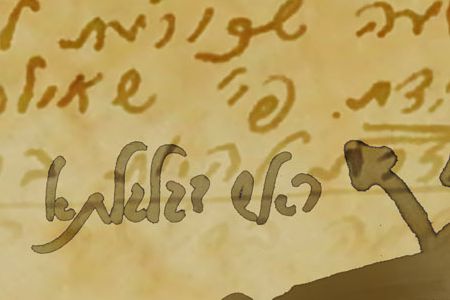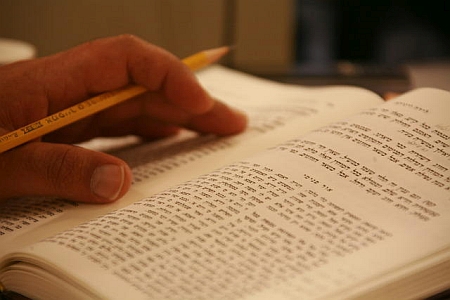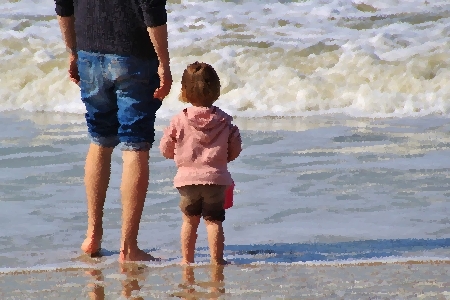Exodus, 18:1-20:22
This Week’s Torah Portion | February 1 – February 7, 2015 – 12 Shevat – 18 Shevat, 5775
In A Nutshell
The portion, Jethro, starts with Jethro, priest of Midian, coming out with Zipporah and Moses’ two sons to meet Moses and the nation, which has come out of Egypt. Jethro gives to Moses some organizational tips regarding how to judge the people, explaining that he should divide them into ministers of thousands, ministers of hundreds, ministers of fifty, and ministers of ten.
The children of Israel arrive at Sinai Desert on the third month of their exodus from Egypt, as it is written, “And Israel camped there, before the mountain” (Exodus, 19:2). Moses climbs Mount Sinai and the Creator tells him, “And now, if you will indeed obey My voice and keep My covenant, then you shall be to Me a Segula (chosen/virtue/remedy) out of all the nations, for all the earth is Mine. And you shall be to Me a kingdom of priests and a holy nation. These are the words that you shall speak to the children of Israel” (Exodus, 19:5-6).
Moses informs the elders of the people about the words of the Creator, and they say, “All that the Lord has spoken we will do” (Exodus 19:8). The Creator commands the people through Moses to sanctify themselves for two days, and be ready on the third day, for this is when the Creator will appear before the whole nation.
On the third day, the children of Israel stand at the bottom of the mountain, but they do not want to meet the Creator face to face, so Moses and Aaron climb Mount Sinai and Moses brings down the Ten Commandments.
The children of Israel ask Moses to speak to them instead of the Creator because they are afraid to die. Moses explains to them that they need not fear because the Creator is coming down in order to test them, and to set the fear of Him in them so they will not sin.
The Creator instructs Moses to tell the children of Israel that because they saw Him speaking with them they are forbidden to make gods of silver and gold. Instead, they must build an altar on the ground and sacrifice on it.

Commentary by Dr. Michael Laitman
Jethro, priest of Midian, is not from Israel. He is from the will to receive in order to receive, a Klipa (shell/peel) that has been mitigated by Moses. Jethro rises and connects to Moses through his Nukva (female), his daughter Zipporah, with whom Moses has two sons. This is the big and broken will to receive that the Moses in us is gradually correcting.
When Moses comes to Jethro after he has fled, a connection is made between the point in the heart, Moses, and the ego. Thus, a correction is made so that afterward it will be easier for a person to make corrections on the more advanced stages.
The correction helps one begin to divide oneself into tens, fifties, hundreds, and thousands, meaning to build the structure of the soul. The whole Torah deals with the construction of our soul and how we turn our egoistic desire into a desire with the aim to bestow. When the desire acquires the aim to bestow, it is called a “soul.”
The force of reception is called the “self,” “this world.” Everything I see and everything I feel is the force of reception. The force of bestowal is exit from reception. When I work in order to bestow, in “love your neighbor as yourself,”[1] I obtain my soul. My inner Moses is pulling away from the quality of reception toward the quality of bestowal, bringing me out of myself, and allowing me to see the upper world and begin to feel the Creator.
The Book of Zohar speaks about it in great detail in the portion, Jethro, but it is still not easy to grasp. It concerns the three lines, the structure of the soul, reception, bestowal, and the middle line, which is the proper combination between them. The Zohar describes how to divide the soul—first into ten Sephirot, according to the Ten Commandments, then according to the three lines, which is thirty. There is also a division into Rosh, Toch, Sof (head, interior, end respectively), and there are many other inner divisions that include the Sephira (singular for Sephirot) Daat.
When we relate to ourselves as coming out of Egypt, examining ourselves from the outside, we examine how we can use our egos to advance us spiritually, toward the aim to bestow. We go through difficult situations such as the escape from Egypt, the tearing of the Red Sea, until we reach Mount Sinai. This is how we build ourselves on the way to correction—through Jethro’s counsels, as well as though actions.
Being at the foot of Mount Sinai requires preparation. This is the “main event,” when we meet the Creator. While we are in the dark, we do not understand why we need to advance. We follow the point in our hearts, Moses.
In a sense, Moses helps us out of Egypt when we escape in the dark. However, we are not conscious participants in this process. At the foot of Mount Sinai is where the upper force first appears to us. This is when we begin to understand our own essence and the essence of the upper force, as well as how to relate to our situation and the way we need to move forward.
In this portion, the first awareness happens. With it awaken all of man’s desires, called “the people,” or the “nation,” and they are afraid. These desires still cannot connect to the Creator; they cannot see or hear Him. They tell Moses, “You speak.” This is the state at which we arrive from the exile, Egypt, our ego. We begin to hear a little bit only by coming down from Keter (crown), which is the Creator. This process unfolds through Hochma and Bina—when Moses and Aaron begin to bring down the great light that appears to the will to receive as laws, as the Ten Commandments, beginning with the first commandment, “I am the Lord your God, who brought you out of the land of Egypt, out of the house of slavery” (Exodus, 20:2), and ends with the final commandment.
The Ten Commandments include all 620 Mitzvot (commandments). These are 620 corrections, which are 613 plus seven Mitzvot of our sages, by which we have to correct our desires. That is, we consist of 620 desires that divide into 613+7 desires.
The 613 Mitzvot connect within them into 248 and 365, and these comprise the structure of the soul. The soul itself consists of ten parts, ten Sephirot, and their correction is called Ten Mitzvot, or Ten Commandments, which are the primary Mitzvot that were given to man. We ascend according to our position, by how we stand before the light that appears to us. Hearing is the degree of Bina, and seeing is the degree of Hochma.
One who has gone through the entire process and has come out of Egypt rises above the ego and is willing to receive the program of bestowal, the program of connecting with the whole of humanity. Such a person is ready for the revelation of Godliness in the connection between all people, as it is written, “Love your neighbor as yourself; Rabbi Akiva says, ‘It is a great rule in the Torah.’”[2] This rule is both the foundation and the result of keeping the Ten Commandments, with the goal being Keter, achieving love, and through the love of others to achieve the love of the Creator.
In our current state, part of humanity is discovering it is in Egypt, another part is discovering that it wants to come out of Egypt, and a part is discovering how to come out and advance toward Mount Sinai. We are beginning to feel we are in the dark, in a process we do not understand. Each day our need for the light is growing, for the revelation of the Creator, for it to shine a tiny illumination on our lives so we may understand what is happening to us.
We need to fix Jethro, the egoistic will to receive, as it is written, “If one should tell you, ‘there is wisdom in the nations, believe.”[3] If Moses did not connect to the desire called Jethro, he would not receive from him the knowledge of judgment and ruling, which is a necessary part for the reception of the Torah.
By disseminating the method of correction to the nations of the world, the method of Arvut (mutual guarantee), and by circulating the necessity for the wisdom of Kabbalah, we are doing the work that Moses did with Jethro. By that we will be rewarded with standing at the foot of Mount Sinai.
In the portion, Jethro, the people of Israel receives the Ten Commandments. This may be the most important portion because the Torah is correction. So why is this portion named after an “external” desire, Jethro?
Jethro is the priest of Midian, a Klipa that stands opposite. He is one of Pharaoh’s servants, similar to other forces that stood next to the will to receive and helped Pharaoh connect and elicit as much as possible from the desire to bestow—Israel. The Zohar appears to be writing bad things about him, but he is help made against us. After all, everything is within us.
What comes out of Egypt is Kelim (vessels), meaning desires. In the desires that come out there is still no intention to work with the will to receive. Moses, the force of Bina, wants to judge the will to receive, which is detached from him. Even while standing before Pharaoh, he wanted to draw the will to receive, though not in order to connect or to elicit anything from it, but to judge it. However, he was unsuccessful.
When we arrive at the state that exists between Moses and the nation that has come out of Egypt, including the mixed multitude and all the layers that oppose the process of bestowal and love of others, there has to be a special system built according to the will to receive, according to corporeality. Moses cannot build it; he can only give from above, seemingly “pouring down,” this is not absorbed in the people. As it is written, Moses grows tired, and the people, who cannot find the right connection, stands next to him all day.
We cannot find the proper relationship between our desire upward, toward the Creator, and our egos—in the family, at work, and in the rest of our worldly life. We need a system that will provide us with Jethro. The wisdom must come specifically from the will to receive, as it is written, “If one should tell you, ‘there is wisdom in the nations, believe.” Although it does not belong to the degree of Bina, it was previously included in it, when Moses spent forty years with Jethro. Moses grew to the degree of Bina with Jethro; now Jethro is seemingly paying back.
Does Jethro put order between Moses and the desires so that Moses can free himself for the real thing—the receiving of the Torah?
Jethro returns to Moses what he received from him when Moses was with him. Moses came to Jethro after fleeing from Pharaoh. He grew while at Jethro’s from the degree of Malchut to the degree of Bina, pure bestowal. He grew at Jethro’s home and “over” Jethro, through his connection with Zipporah and the two sons that he had—from the right and from the left, with him in the middle. Everything that Moses has given to Jethro and instilled in him is now returning to him—Jethro, Zipporah, and the two sons. There was a mingling of Bina in Malchut, and now Malchut is giving back to Bina.
In this way Moses can now build the entire system of connecting Bina to Malchut, and he is ready to receive the Torah. This is why the first encounter with the Creator is named after Jethro, since precisely because of the system that was built before, it is now possible to reach the state of being at Mount Sinai.
On the one hand, the children of Israel were afraid of turning to the Creator for fear of dying. On the other hand, it is known that the Creator receives specifically prayers that come from the heart. So where does the fear come from? Why were the children of Israel afraid?
Our will to receive is still not equipped with a Masach (screen) that can withstand the light. That is, the light still seems like darkness. What is the exodus from Egypt in the dark? There is no dark, but it seems dark to us because we are still not corrected. The Aramaic word Ohrta (night) is very similar to the Hebrew word Ohr (light). That is, at one time it is night, and at another time it is light, depending on how a person experiences it.
From The Zohar: And Jethro Heard
They all shook and looked at Jethro, who was wise and the great appointee over all the idols of the world. When they saw him approaching and serving the Creator, saying, “Now I know that the Lord is greater than all the gods,” they all veered away from their works and knew that they were futile. Then the glory of the holy Name of the Creator was glorified on all sides. This is why this portion was written in the Torah, and the beginning of the portion is with Jethro.
Zohar for All, Jethro, item 42
Jethro is the first will to receive that surrenders and accepts the sovereignty of the Creator. This is why this portion is named after him. The Zohar also mentions Gematria, why Jethro is called Jethro, why Zipporah is called Zipporah, and all the other events in the portion.
In this portion we hear that the children of Israel camped at the foot of Mount Sinai. What does it mean to camp there?
Camping is similar to what happens on Hanukah. It is clear that we cannot correct our ego at that time, but only take an advice, a way, a program, a goal that can be implemented over time according to the level of our understanding of the program. Only at the end of the desert, at the entrance to the land of Israel, does the people discover everything that Moses said to them in his final words prior to his demise.
From The Zohar: You Shall Not Kill; You Shall Not Commit Adultery
When that filth was removed from them, Israel remained pure bodies without any filth, and the soul inside the body was as the brightness of the firmament to receive light. So were Israel, who saw and regarded the glory of their master. This was not so on the sea because the filth was not removed from them at that time, while here in Sinai, when the filth stopped from the body, even fetuses in their mothers’ intestine saw and looked at the glory of their Master. All of them, each and every one, received as befitted him.
Zohar for All, Jethro, items 572-573
Spiritual ascension can be the result of two states—an awakening from above and an awakening from below. In an awakening from above, the light shines from above and sanctifies the person, giving one the force of bestowal through which one begins to look into the distance against one’s ego. Such a person sees the world outside oneself, the spiritual world. That person knows the upper force, the Creator. An awakening from below comes from the person through extensive work on connecting with others. When one collects awakenings from everyone, one reaches the same awakening as the one that can be received from above.
Naturally, our own work from below is more desirable and appreciated because if we collect the forces from the friends, and each of them collects strength from the friends, as well, and each has his or her own strength, that force becomes permanently theirs. Here a person is seemingly camping only to take advice as to what to do. To hear the advice, one must wake up. It is similar to the exodus from Egypt through a force from above, an external force that pushes us and pulls us. But afterward we must actualize the forces we have received during the forty years in the desert.
Something special happens at Mount Sinai, purification, a special force we receive.
The light that affects us is called “the light that reforms.” It is written, “I have created the evil inclination; I have created for it the Torah as a spice”[4] because “the light in it reforms them.”[5] It reforms the evil inclination and makes it good. Initially, we are all in the evil inclination, egoists, and all we need is the Torah, assuming it is the real Torah, as it is written, “If one should tell you, ‘there is wisdom in the nations, believe; there is Torah in the nations, do not believe.”[6]
A “person from the nations” is a desire to receive that wants to receive for itself. Israel is one who strives to achieve bestowal, love of others, and from the love of others to achieve the love of the Creator.
This is why those how are craving are called “Israel,” and they learn the wisdom of Kabbalah because it brings the light that reforms. This is how we become sanctified, acquiring the force of bestowal and rise through it. The greater the force of bestowal one possesses, the greater the love of others, and the holier that person is considered to be.
Summary
From this portion we can learn that to an extent, our connection between the desire to bestow and the will to receive has to constantly exist. The wisdom of Kabbalah does not tell us to ruin our egos, but rather to use it correctly. This is why it is called Hochmat ha Kabbalah (the wisdom of receiving); it is the wisdom of how to use the vessels of reception.
We do not need to avoid using the vessels of reception, or to be “above” the worldly life. Rather, we need to discover the evil inclination detaching us from connection with the rest of the world, as it was said to Moses, “And you will be to Me a kingdom of priests and a holy nations” (Exodus, 19:6). That is, the role of the people of Israel is to offer itself to the service of the rest of the world.
[1] “Love your neighbor as yourself. Rabbi Akiva says, ‘It is a great rule in the Torah’” (Jerusalem Talmud, Seder Nashim, Masechet Nedarim, Chapter 9, p 30b)..
[2] Jerusalem Talmud, Seder Nashim, Masechet Nedarim, Chapter 9, p 30b
[3] Midrash Rabah, Eicha, Parasha 2, Paragraph 13
[4] Babylonian Talmud, Masechet Kidushin, 30b
[5] Midrash Rabah, Eicha, “Introduction,” Paragraph 2
[6] Midrash Rabah, Eicha, Parasha 2, Paragraph 13




